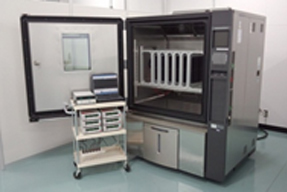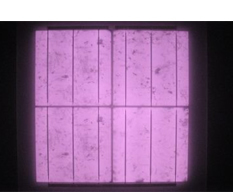PID Test (Chamber Method)
Test summary/features
-
PID (potential induced degradation) is a type of deterioration that occurs in solar power generation systems. It is caused by leak current created by a large potential difference generated between a PV module frame and module circuit. PID is considered to be a factor responsible for solar power generation system output drops, and to be promoted by humidity. Accurate PID evaluation requires leak current measurement after applying a high voltage in a high-temperature/humidity environment with high precision and reproducibility.

- Test equipment
-
The latest trend in PID evaluation testing is to focus on the effect that moisture has in promoting deterioration, so PID evaluation testing (chamber method) in a high-temperature/humidity environment is receiving widespread attention.
- Mini-module size
Three sample panels can be tested simultaneously.
New design developed for high-insulation apparatus for PID testing. - Full module size
Ten sample panels can be tested simultaneously. - Supports solar battery output measurement/EL measurement before and after PID testing.
- Mini-module size
- Equipment particulars
-
- PID Test System (installed at Kobe Test Center)

- PID Test System

- EL (electroluminescence) image
| Item | Test conditions (IEC 62804, 1st edition, issued August 6, 2015) |
| Chamber temperature | 60°C±2°C or 85°C±2°C |
| Chamber humidity | 85%±5% |
| Applied voltage condition | -600DCV or -1000DCV |
| Leak current measurement range | ±200nA to ±1mA |
| Number of basic channels | 3ch |
- Solar battery panel evaluation testing
-
ESPEC carries out many types of outsourced evaluation testing of solar batteries exposed to demanding environments. Samples ranging from material components to finished modules are evaluated. We subject solar batteries to thermal cycling testing and temperature/humidity cycle testing in compliance with IEC standard compliance testing, and propose test equipment to meet client test needs.
- Main test types for solar battery panels
- Temperature/humidity cycle testing
- Thermal (heat retention) testing
- Humidity resistance testing
- Humidity freeze testing
- Temperature/humidity testing required by IEC and other standards
- Related pages
-
Test Navi: Observations at a QA conference

